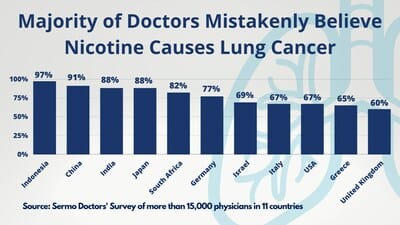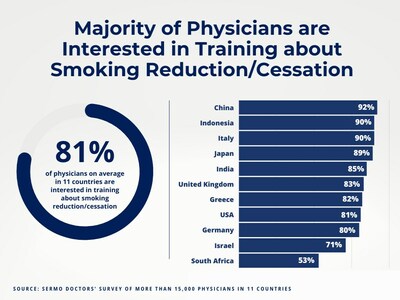Survey of more than 15,000 physicians in 11 countries uncovers need for further education
The Foundation for a Smoke-Free World invites researchers to propose new analysis & educational programs
- On average, nearly 77% of doctors mistakenly believe nicotine causes lung cancer and 78% believe it causes atherosclerosis.
- While on average 87% of doctors at least moderately agree that helping patients quit smoking is a priority, lack of training and nicotine knowledge adversely impacts quitting and harm reduction advice.
- Encouragingly, on average, more than 80% of physicians surveyed are at least moderately interested in cessation and tobacco harm reduction training.
NEW YORK, July 20, 2023 /PRNewswire/ — A significant majority of doctors across the globe mistakenly attributes the negative health consequences of smoking to nicotine, directly jeopardizing advancements made in helping smokers quit, a survey funded by a Foundation for a Smoke-Free World grant has found.
Sermo, an independent platform and leader in actionable healthcare professional insights, surveyed more than 15,000 doctors online in 11 countries (China, Germany, Greece, India, Indonesia, Israel, Italy, Japan, South Africa, United Kingdom, and the United States).
While an average of 87% of doctors at least moderately agree helping patients quit smoking is a priority, it is troubling that on average 74% mistakenly believe nicotine causes a range of illnesses from lung cancer to COPD.
These results raise serious concerns about doctors’ ability to equip patients who smoke with the most accurate and effective advice on how to quit. This misperception could account for the fact that on average only about half of the doctors (55% on average) recommend over the counter nicotine replacement therapy to aid patients with smoking reduction or cessation.
“It is imperative that doctors get the proper training to learn the facts about nicotine and tobacco harm reduction options that can help their smoking patients quit” said Dr. Muhammad Ahmed, Director of Health and Science Research, Foundation for a Smoke-Free World. “With more than 7 million smokers dying annually from smoking-related diseases worldwide, many lives can be saved if doctors become more knowledgeable about the cessation tools available.”
Dr. Jed Rose, President and CEO of Rose Research Center (RRC) and co-inventor of the nicotine patch, said, “Patients look to doctors for trusted health advice. Therefore, it is vital that doctors provide accurate, current advice to smokers about the health risks of smoking cigarettes compared to using products that deliver nicotine without combustion.“
RRC is a research facility based in Raleigh, NC that specializes in tobacco dependence research, including research on smokers, addiction, smoking cessation, tobacco harm reduction and the use of other tobacco products. RRC is a Foundation for a Smoke-Free World grantee.
Even though there is near unanimity in the healthcare community that combustion, more than nicotine, is what leads to the negative health consequences from smoking, the Doctors’ Survey uncovered that:
- 74% of doctors on average at least moderately agree that nicotine causes lung, bladder and head/neck/gastric cancer;
- In the United States this figure is 70%
- In Germany this figure is 78%
- In China this figure is 86%
- In Japan this figure is 85%
- 78% of doctors on average at least moderately agree that atherosclerosis is caused by nicotine; and
- 76% of doctors on average at least moderately agree that COPD is caused by nicotine.
Although these misperceptions are alarming, on average 81% of the physicians surveyed are at least moderately interested in training focused on smoking cessation and tobacco harm reduction.
The survey, which was conducted in 2022, also found that while doctors’ conversations with patients who smoke focus on the health benefits of cutting down or quitting (73% on average, globally) and the health risks of continuing (73% on average, globally), a comparatively small number of physicians – just over half (56% on average, globally) on average – recommend cutting down on the amount of smokable tobacco products and less than half of doctors (48% on average, globally) help patients develop a plan to quit.
The Foundation for a Smoke-Free World invites researchers to submit proposals to further analyze the Doctors’ Survey findings and propose programs that would help improve doctors’ fluency about smoking cessation and tobacco harm reduction.





